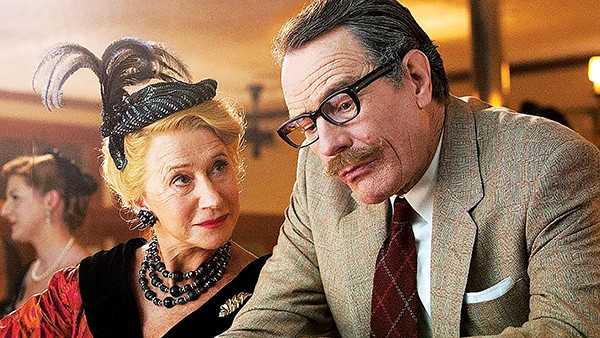As a writer, I’m always suspicious of movies about writers. The protagonist is always hailed as being exceptionally talented but probably troubled. But when our hero is called upon to read his writing that everyone in the film says is so great, it turns out to not be very impressive, because the film’s writer is not as much of a genius as his character is supposed to be. And let’s face it: The life of the writer is not very interesting. It mainly consists of sitting still in front of a laptop and fretting.
But Dalton Trumbo was interesting. He didn’t just sit still in front of a typewriter — he sat in a tub surrounded by booze, ashtrays, and a typewriter. Trumbo won the National Book Award in 1939, got nominated for a screenwriting Academy Award in 1940, joined the Army after Pearl Harbor, and, after the war, became the highest paid writer in Hollywood. He was also, for five years, a member of the Communist Party of the United States, which would come to cost him dearly when the House Un-American Activities Committee (HUAC) called him to testify in 1948. Trumbo considered himself a patriot, and thought that HUAC had no legal or ethical right to persecute an American citizen for his political beliefs, so he and his compatriots refused to answer the committee’s questions and were convicted of contempt of Congress. Trumbo became known as the leader of the “Hollywood 10” who were blacklisted and no longer allowed to work with the major Hollywood studios.

Helen Mirren and Brian Cranston in Trumbo
Bryan Cranston plays Dalton Trumbo in Jay Roach’s adaptation of the writer’s life, and as you would probably expect, he does a tremendous job. Cranston’s work as Walter White on Breaking Bad has cemented him as one of the best actors working today, and he fully inhabits the role of the too-smart-for-his-own-good leftist with a big mouth and a precision-guided pen. Trumbo wrote scripts the old-fashioned way, buoyed by a heroic intake of scotch, nicotine, and amphetamines, and there is rarely a shot in Trumbo where Cranston is without a lit cigarette curling smoke from a long filter. There’s so much smoking going on that when Trumbo’s fellow traveller Arlen Hird (Louis C.K.) tells Trumbo he has lung cancer, it’s completely unsurprising. There are a lot of acting heavy hitters in Trumbo, but the scenes between Cranston and C.K. are by far the sharpest. Hird sees through Trumbo’s prodigious bullshit, but he plays along because he both agrees with and respects the older man. Cranston also gets to match wits with Helen Mirren as Hedda Hopper, the arch anti-communist gossip columnist whose column in the Hollywood Reporter reinforced the blacklist. Diane Lane plays Trumbo’s wife Cleo, and Elle Fanning his daughter Niki, both of whom feel the negative effects of Trumbo’s crusade. Other welcome actors include the underutilized Alan Tudyk as Ian McLellan Hunter, Trumbo’s friend who served as a front writer for the Academy Award-winning screenplay for Roman Holiday; John Goodman as hack studio head Frank King; and Dean O’Gorman, last seen as the dwarf Fili in The Hobbit trilogy, does an absolutely uncanny impression of Kirk Douglas
The actors are having such a good time that Trumbo‘s weaknesses in the story department are mostly papered over. Cranston’s huge, humane portrayal is great fun to watch, but he may come on too strong for the overall good of the picture. His confidence never wavers, even when he’s being strip-searched in prison, which means his character never changes. This is a common malady of biopics and historical dramas shared by, among others, Selma. Like Ava DuVernay in that film and F. Gary Gray in Straight Outta Compton, director Jay Roach plays it pretty safe, style-wise, choosing to focus on the characterization. Writer John McNamara’s dialogue gives the actors plenty of material to work with, but he lacks his subject’s talent for structural clarity. It would probably please Trumbo to hear a critic say Trumbo would have been better had Trumbo written it himself.